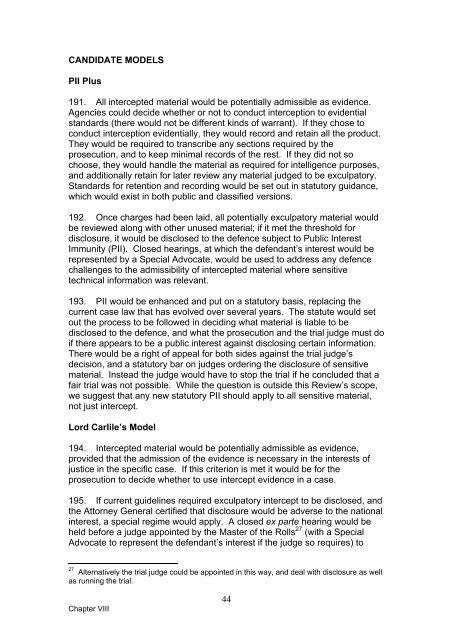Privy Council Review of intercept as evidence: report - Official ...
Privy Council Review of intercept as evidence: report - Official ...
Privy Council Review of intercept as evidence: report - Official ...
You also want an ePaper? Increase the reach of your titles
YUMPU automatically turns print PDFs into web optimized ePapers that Google loves.
CANDIDATE MODELS<br />
PII Plus<br />
191. All <strong>intercept</strong>ed material would be potentially admissible <strong>as</strong> <strong>evidence</strong>.<br />
Agencies could decide whether or not to conduct <strong>intercept</strong>ion to evidential<br />
standards (there would not be different kinds <strong>of</strong> warrant). If they chose to<br />
conduct <strong>intercept</strong>ion evidentially, they would record and retain all the product.<br />
They would be required to transcribe any sections required by the<br />
prosecution, and to keep minimal records <strong>of</strong> the rest. If they did not so<br />
choose, they would handle the material <strong>as</strong> required for intelligence purposes,<br />
and additionally retain for later review any material judged to be exculpatory.<br />
Standards for retention and recording would be set out in statutory guidance,<br />
which would exist in both public and cl<strong>as</strong>sified versions.<br />
192. Once charges had been laid, all potentially exculpatory material would<br />
be reviewed along with other unused material; if it met the threshold for<br />
disclosure, it would be disclosed to the defence subject to Public Interest<br />
Immunity (PII). Closed hearings, at which the defendant’s interest would be<br />
represented by a Special Advocate, would be used to address any defence<br />
challenges to the admissibility <strong>of</strong> <strong>intercept</strong>ed material where sensitive<br />
technical information w<strong>as</strong> relevant.<br />
193. PII would be enhanced and put on a statutory b<strong>as</strong>is, replacing the<br />
current c<strong>as</strong>e law that h<strong>as</strong> evolved over several years. The statute would set<br />
out the process to be followed in deciding what material is liable to be<br />
disclosed to the defence, and what the prosecution and the trial judge must do<br />
if there appears to be a public interest against disclosing certain information.<br />
There would be a right <strong>of</strong> appeal for both sides against the trial judge’s<br />
decision, and a statutory bar on judges ordering the disclosure <strong>of</strong> sensitive<br />
material. Instead the judge would have to stop the trial if he concluded that a<br />
fair trial w<strong>as</strong> not possible. While the question is outside this <strong>Review</strong>’s scope,<br />
we suggest that any new statutory PII should apply to all sensitive material,<br />
not just <strong>intercept</strong>.<br />
Lord Carlile’s Model<br />
194. Intercepted material would be potentially admissible <strong>as</strong> <strong>evidence</strong>,<br />
provided that the admission <strong>of</strong> the <strong>evidence</strong> is necessary in the interests <strong>of</strong><br />
justice in the specific c<strong>as</strong>e. If this criterion is met it would be for the<br />
prosecution to decide whether to use <strong>intercept</strong> <strong>evidence</strong> in a c<strong>as</strong>e.<br />
195. If current guidelines required exculpatory <strong>intercept</strong> to be disclosed, and<br />
the Attorney General certified that disclosure would be adverse to the national<br />
interest, a special regime would apply. A closed ex parte hearing would be<br />
held before a judge appointed by the M<strong>as</strong>ter <strong>of</strong> the Rolls 27 (with a Special<br />
Advocate to represent the defendant’s interest if the judge so requires) to<br />
27 Alternatively the trial judge could be appointed in this way, and deal with disclosure <strong>as</strong> well<br />
<strong>as</strong> running the trial.<br />
Chapter VIII<br />
44
















